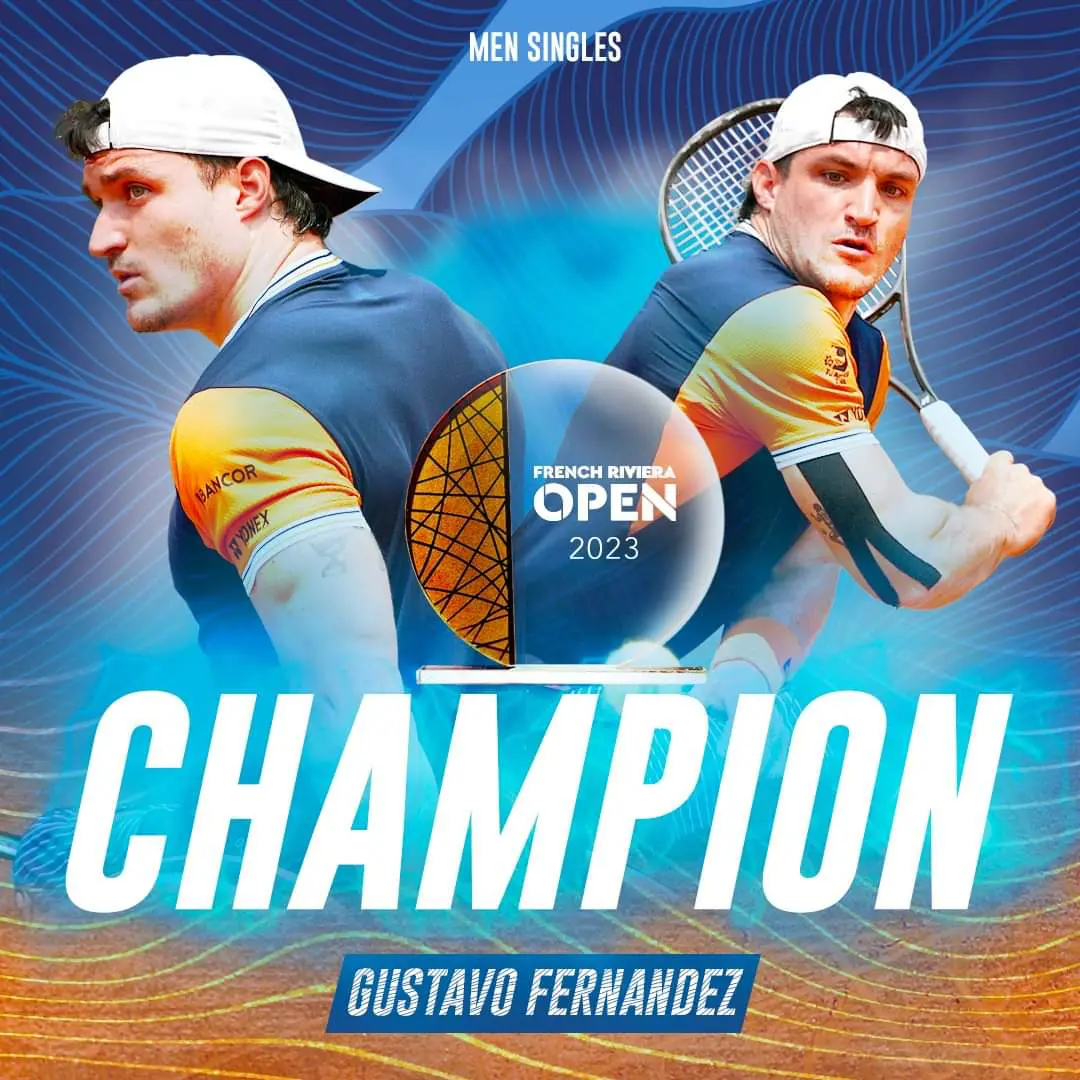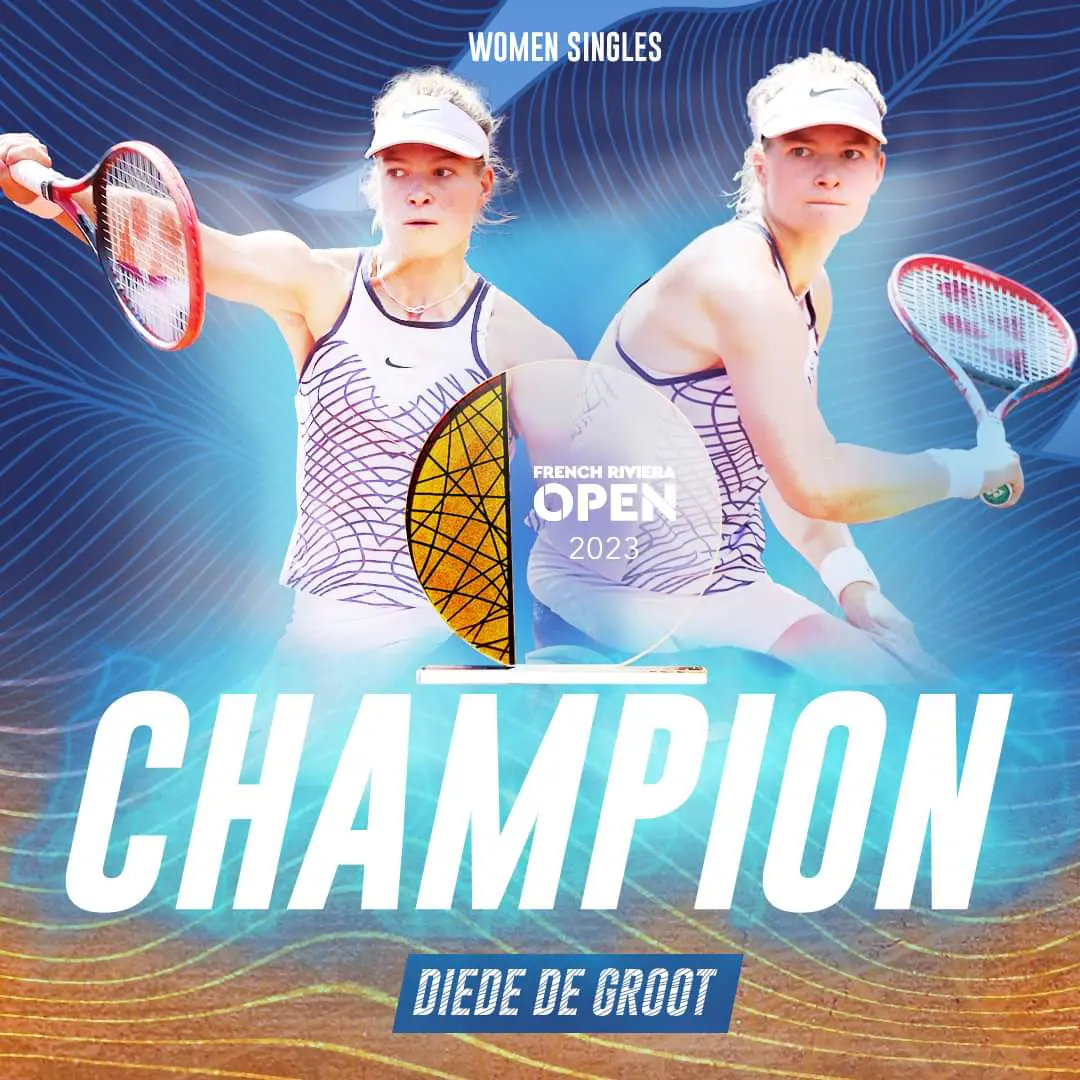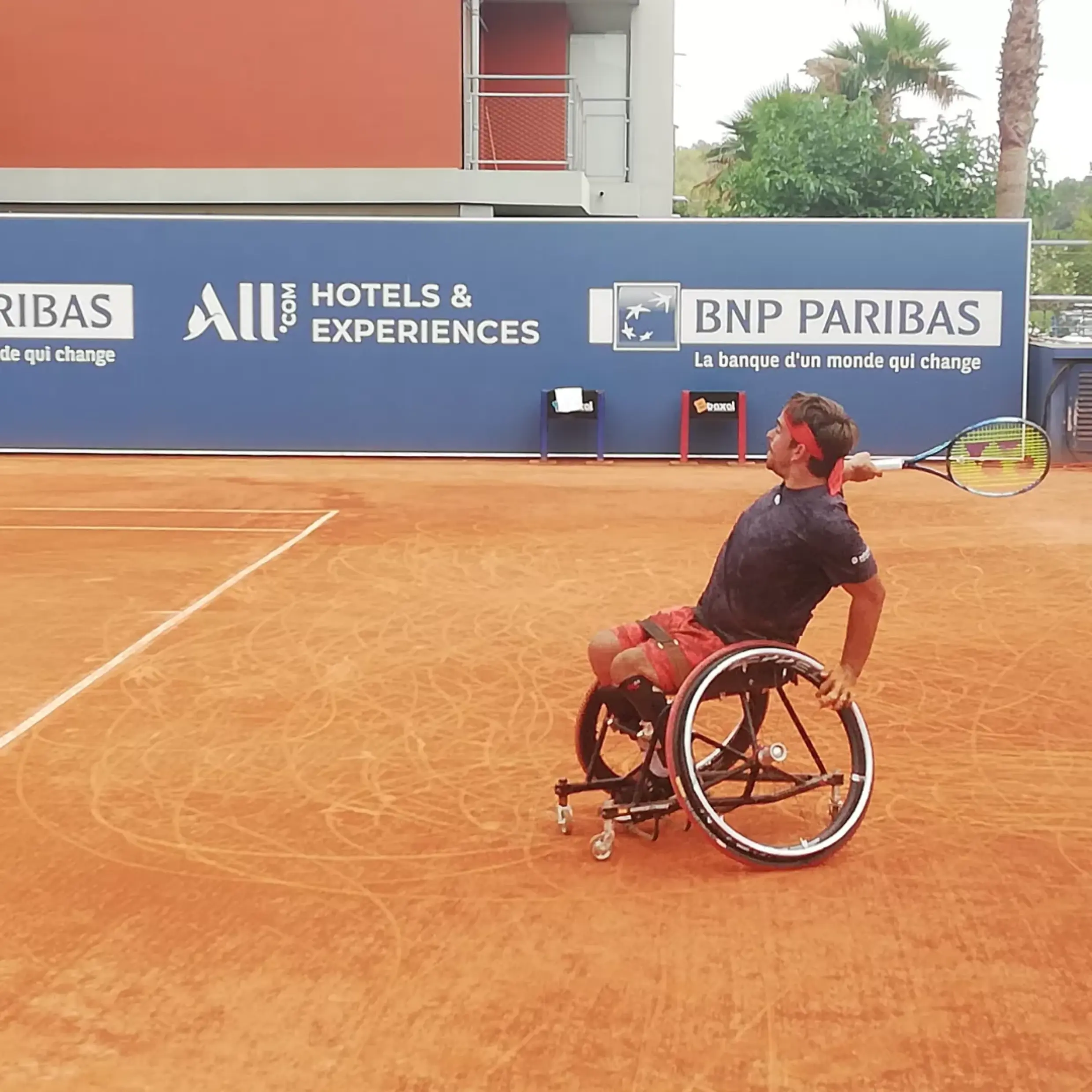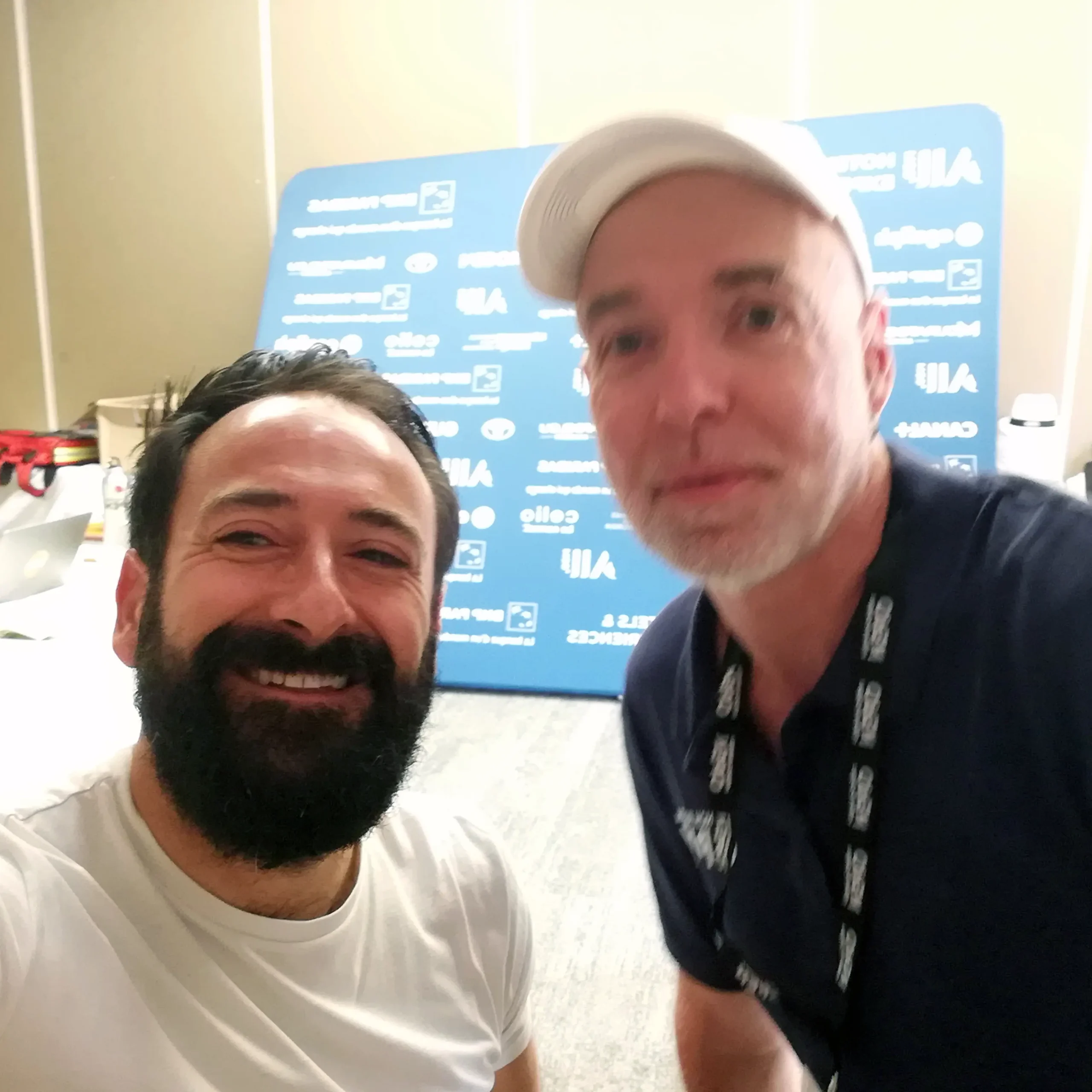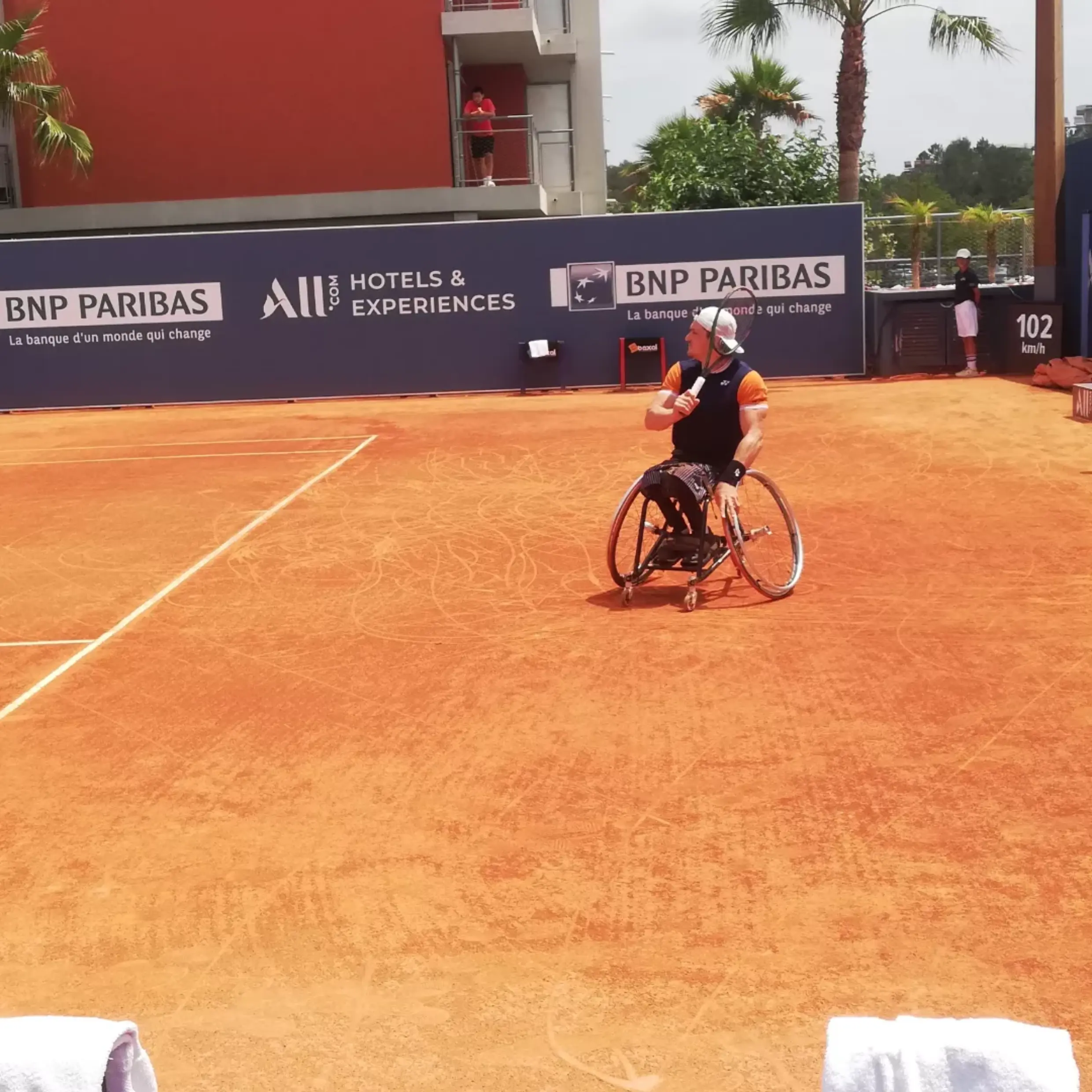Dans la peau d’un kiné au French Riviera Open
François CHEVET is one of our Physical Therapist, private practitioner, and writer on ‘Disability’ who shares with us his involvement as a physiotherapist at the French Riviera Open.
Here is his testimonial …
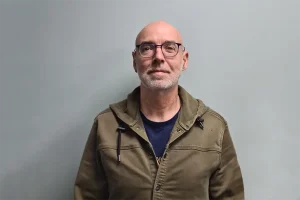
Le French Riviera Open took place at the Mouratoglou Academy in Antibes From June 11th to 18th, 2023. It brought together the top 70 male and female wheelchair tennis players from around the world for both singles and doubles competitions. The playing surface? Clay courts, of course. In this impressive complex with over 30 courts and on-site accommodations, athletes were able to enjoy exceptional conditions to compete at their best.
And when it comes to being in top form, physiotherapists play a crucial role !
Welcomed with great hospitality, there were two of us, Marion and myself, to take care of the players throughout the day. Our working hours? 8 am to 9 pm (with some busy moments and some quieter ones), managing appointments through email and the option to step onto the court at the request of the umpire if needed, always remaining available thanks to a walkie-talkie.
For my part, at the age of 57, I’ve worked in a wide range of events and practiced the gentle profession of a physiotherapist in various forms. However, this was the first time I had the opportunity to live in the midst of such an organization with such freedom. Certainly, places like Pitié Salpetrière, the Coubert center, and many other facilities are also like self-contained mini-cities, but our roles are closely regulated. Here, in the heart of the athletes and competition, we had the complete freedom to organize ourselves in well-equipped facilities dedicated to our care. Our tasks? Receiving athletes while managing our schedule, before or after their matches.
The disabilities related to wheelchair tennis were not unfamiliar to me, to say the least, and were customary in my care: paraplegia, lower tetraplegia, amputations. The atmosphere of being a “Sports Physio” was also familiar to me, and it was easy for me to make myself available and provide my assistance and treatments to the best of my abilities.
To summarize, I must admit, just like my colleague Marion, we didn’t struggle much with individual physiotherapy sessions (approximately 30 minutes each), combining assessments, treatments, and follow-ups throughout the week. In terms of equipment? The Mouratoglou Academy provided us with adequate resources for our profession: facilities, hygiene, electric
So, you might say, “What a relaxed week the old physiotherapist had!” No stress at all, except for the good adrenaline that comes from constantly putting our adaptability to the test.
Well, let me tell you, it wasn’t all smooth sailing, especially at the beginning.
I did indeed work for 20 years in a center for polytrauma patients, lugging my medical bags around various gyms (weekends and all sorts of training sessions). But I must confess, I am from the very old school, the one that speaks only French.
And then, François, brace yourself, my friend.
A Chilean? That’s manageable, with English that’s reminiscent of the early discoveries of the New World. An Israeli? It gets a bit tricky (they handle it, those folks!). But then, an Englishwoman (“slowly, please!”) and most Europeans (a)? Let’s not even talk about it. I felt diminished, handicapped, to be honest (yes, disability is situational). I watched my colleague Marion (who works in Geneva and was trained in osteopathy at a bilingual school) excel in her interactions, skillfully dispensing valuable advice. She hit the mark, she navigated with precision through the information, exchanges, and all the personal aspects of the patient’s world that it’s good to master in order to better understand the context and target treatments and programs.
So there I was, revising my sentences at night on my translation app (quite useful, by the way), and regretting my limited English proficiency. I have, however, had to translate medical articles from British English for publications, but I had the time and the proper setup for that cerebral and literary work.
Here, in the real life of a healthcare provider, you’re approached in the aisles of the tournament, and your mind goes blank, unable to find the right words. Your expressions are reduced to the bare essentials, insufficient to encompass the patient as a whole. Of course, you still have the language of hands, like music, an international tool for information and treatment. It disregards nationalities and remains our foundational core. But an organ is tied to a function, and a function is tied to a body, which is in turn linked to a way of life, and my hands don’t speak English.
Durant la semaine, je me suis senti de plus en plus à l’aise avec cette langue internationale au point, comme m’avait prévenu Marion, de finir par mélanger français et anglais et penser presque à certains moments (si si, je vous assure) dans la langue d’Andy Murray. Le tournoi s’est terminé dimanche par la victoire disputée de l’argentin Gustavo Fernandez et de la néerlandaise Diede de Groot.
Je tire de cette semaine des rencontres de belle qualité avec tous les joueurs et joueuses pris en charge, avec le staff génial de très grande humanité (organisateurs, ramasseurs de balles, corps arbitral , avec Marion, intelligente, sensible et d’une finesse d’analyse et d’expertise rares.
Allez, 5 leçons à retenir :
- un sport individuel n’est pas un sport collectif : privilégier les moments de soins appropriés à un traitement d’écoute personnalisé.
- bossez votre anatomie et vos cours de pathologie sur les différents handicaps possibles en fauteuil et observez bien les spécificités de certains gestes pathogènes. (b)
- n’essayez pas de systématiser vos soins, chaque sportif est différent ( et c’est bien ici la richesse des rencontres).
- soyez modeste et disponible tout en restant guide de vos traitements et de vos conseils
- et enfin, my god, mettez vous à l’anglais et ne lâchez pas l’affaire.
Un grand merci à Mika Jérémiasz, polymedaillé en tennis fauteuil roulant , fondateur de l’association Comme les autres et président du French Riviera Open.
I thank you for your attention.
François Chevet.
- (a) pays les plus représentés = Japon, Pays-Bas, France, Israël, Espagne, Angleterre, Chine, Chili…
- (b) l’extenseur ulnaire du carpe est sollicité de manière intense et spécifique lors du geste de revers si singulier, s’approchant parfois de certains cinétiques de pelote basque.
For CEERRF, as a conclusion, this testimony highlights the essential need to sensitize physiotherapy students to the importance of mastering the English language, as well as the intricacies of working with athletes with disabilities in the field of sports. The French Riviera Open provided a unique setting where physiotherapists like François CHEVET had to overcome the challenge of language barriers. His experience underscores that effective communication and understanding are paramount in providing personalized care, transcending borders and origins.
In this context, our educational program takes into account this demand from students by promoting international exchanges and openness to the world through our participation in the Erasmus+ and ENPHE programs. Initiatives like the Virtual Exchange in Physiotherapy and International week have been implemented. This approach aims to break down cultural and language barriers, promoting learning and the choice of a reflective and globally oriented physiotherapy education. Furthermore, key lessons from this experience include adaptation to the diversity of disabilities, personalized treatments, coupled with humility and expertise. Overall, this narrative underscores the undeniable importance of language, disability awareness, and sports in training competent and compassionate healthcare professionals.

